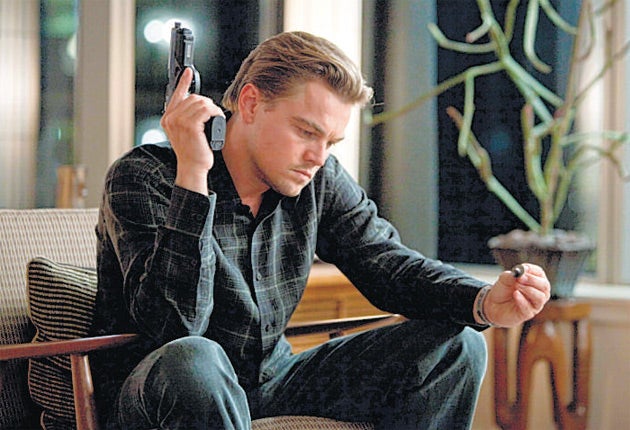Inception (12A)

Your support helps us to tell the story
From reproductive rights to climate change to Big Tech, The Independent is on the ground when the story is developing. Whether it's investigating the financials of Elon Musk's pro-Trump PAC or producing our latest documentary, 'The A Word', which shines a light on the American women fighting for reproductive rights, we know how important it is to parse out the facts from the messaging.
At such a critical moment in US history, we need reporters on the ground. Your donation allows us to keep sending journalists to speak to both sides of the story.
The Independent is trusted by Americans across the entire political spectrum. And unlike many other quality news outlets, we choose not to lock Americans out of our reporting and analysis with paywalls. We believe quality journalism should be available to everyone, paid for by those who can afford it.
Your support makes all the difference.Christopher Nolan's Inception, like Pixar, works at the cutting edge of technological sophistication.
It is a grandiose conceptual thriller in which Leonardo DiCaprio plays a brilliant "extractor", one who enters another's dreams and filches their secrets. Apparently his success rate has made him notorious in the corporate espionage racket, but now there's a new wrinkle. His latest client (Ken Watanabe) wants him not to steal an idea, but to insert one in the mind of a business rival (Cillian Murphy).
For the first 15-20 minutes I had absolutely no idea what was going on. Dreams-within-dreams, projections, figments and mazes are part of the fancy talk batted around by DiCaprio and his cool young team of specialists, who include Ellen Page, Tom Hardy, Joseph Gordon-Levitt and Dileep Rao. As the fog thins, we find that Nolan is dispersing his narrative over a number of levels, flip-flopping between a car chase through rain-lashed streets, a gunfight atop an Alpine redoubt, another in "unreconstructed dream space" – wherever that is. So we're essentially watching a sychronized cycle of dream sequences, with occasional intrusions from the ghost of DiCaprio's wife (Marion Cotillard), who still has some unspecified grievance with her husband. This is a lot to digest, even at two-and-a-half hours' length. It is intricate, it is convoluted, it is mysterious. It is also lavishly boring.
Advance word on the movie promised mind-blowing visual effects, and there are indeed some arresting images along the way. Admire, if you will, a city folding over on itself like a gigantic sandwich, or the funhouse spectacle of Gordon-Levitt fighting a bad guy in a zero-gravity hotel corridor. But the point of them? Are we really admiring inventiveness here, or just those tricks that designers can conjure in a lab? It is said that Inception is a long-cherished project of Nolan's, though its metaphysical hoop-jumping has nothing new on the first Matrix, or Minority Report, or even his own great Memento, which is about 10 times more exciting and made for a fraction of the present film's $200m. The real cause of wonder, though, is why Nolan should have embraced technocratic complexity in the service of such a puny story – namely, how to dupe the unloved son of a tycoon into breaking up his business empire. What possible insight does that afford us into our dreams, or our fears, or that level of consciousness we know as "life"? And this is a film I've already heard being hailed as a masterpiece. Hmm. In your dreams...
Join our commenting forum
Join thought-provoking conversations, follow other Independent readers and see their replies
Comments